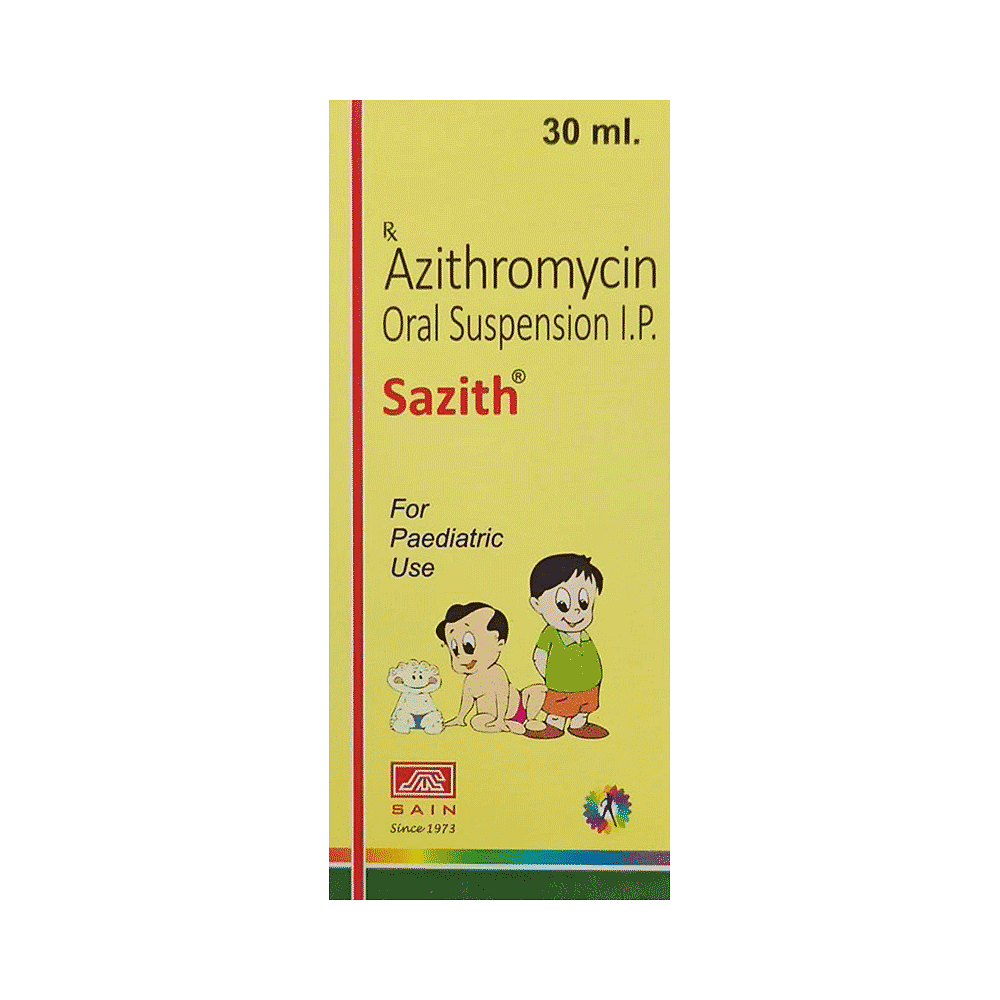
Zicon Suspension
Manufacturer
Antiseptic Pharmaceuticals
Salt Composition
Azithromycin (100mg)
Key Information
Short Description
Zicon Suspension is an antibiotic medication used to treat a wide range of bacterial infections in children.
Dosage Form
Suspension
Introduction
Zicon Suspension is an antibiotic medication commonly given to children for the treatment of bacterial infections targeting the ear, eyes, nose, throat, lungs, skin, and gastrointestinal tract. It is essential to complete the entire course of this medicine to avoid the bacteria multiplying again or causing another infection.
Directions for Use
Give Zicon Suspension with food to avoid an upset stomach. Encourage your child to drink plenty of water in case diarrhea develops as a side effect.
How it works
Zicon Suspension is an antibiotic that works by interfering with the synthesis of essential proteins required by bacteria to perform important functions. It stops the infection-causing bacteria from growing further and prevents the infection from spreading.
Quick Tips
Complete the entire course of this medicine to avoid the bacteria multiplying again or causing another infection Give Zicon Suspension with food to avoid an upset stomach Encourage your child to drink plenty of water in case diarrhea develops as a side effect Only give Zicon Suspension to your child for their current infection Stop the medicine and contact the doctor immediately if your child develops an itchy rash, facial swelling, and breathing difficulties soon after the intake
Related Medicines

Sazith Suspension

Moazil Suspension

Azital Suspension

Azel Suspension

Orizee 100mg Suspension

Azithrot Suspension

Azrocin Suspension

Azitek 100mg Suspension

Azidel 100mg Suspension

Azimo Suspension
Frequently asked questions
What if I give too much of Zicon Suspension by mistake?
Zicon Suspension is unlikely to cause significant harm if an extra dose is given accidentally. However, if you believe your child has taken more than the prescribed dose, immediately consult a doctor. Overdose may lead to unwanted side effects and potentially worsen your child's condition.
Are there any possible serious side effects of Zicon Suspension?
Serious side effects of this medication include persistent vomiting, kidney damage, allergic reactions (like rash or hives), diarrhea, and severe gastrointestinal infections. Always consult your child's doctor for help in such situations.
Can other medicines be given at the same time as Zicon Suspension?
Zicon Suspension may interact with certain medications or substances. It is essential to inform your child’s doctor about all other medications they are taking before starting Zicon Suspension. Additionally, consult a healthcare professional for guidance before giving any medication to your child.
Can I get my child vaccinated while on treatment with Zicon Suspension?
Antibiotics generally don't interfere with the ingredients in vaccines or cause adverse reactions in children after vaccination. However, children taking antibiotics should not be vaccinated until they recover from their illness. Once your child feels better, the vaccine can be given. It’s best to consult a doctor about the timing.
Which all lab tests should my child undergo while taking Zicon Suspension on a long-term basis?
The doctor may recommend regular checks for kidney function and liver function tests during prolonged use of Zicon Suspension. This helps to monitor your child's overall health.
Can Zicon Suspension impact my child’s digestion?
Children often experience digestive upset when taking medications. Antibiotics can affect the natural bacteria in a child’s gut, possibly leading to diarrhea. This medication may kill off beneficial bacteria while also eliminating harmful ones, increasing your child’s risk of developing other infections. If your child experiences diarrhea while on Zicon Suspension, do not stop the medication; contact their doctor for guidance on next steps. They may adjust the dosage or provide alternative treatment options.
Why is Zicon Suspension given for 3 days?
The length of treatment depends on the type of infection being treated and the child's age. Zicon Suspension is not always administered for three days; for many bacterial infections, a single dose of 500 mg is provided for three days. Alternatively, it can be given as 500 mg once on day one, followed by 250 mg once from day two to day five. In some instances of specific infections like genital ulcer disease, a single 1 gram dose is prescribed. It's important to follow the doctor’s instructions for the right dosage and duration.
What should I avoid while taking Zicon Suspension?
It is generally advised that patients taking Zicon Suspension should avoid taking antacids with this medication, as it may affect its overall effectiveness. Additionally, minimizing exposure to sunlight or tanning beds is recommended because Zicon Suspension can increase the risk of sunburn.
Is Zicon Suspension a strong antibiotic?
Zicon Suspension is an effective antibiotic used for treating various bacterial infections. Unlike other antibiotics, it has a longer half-life, meaning it remains in the body for a longer period. Therefore, it is administered once a day and for a limited duration. Other antibiotics typically have shorter half-lives and are taken multiple times daily (twice, thrice, or four times).
Can you get a yeast infection from taking Zicon Suspension?
Certain individuals may develop a fungal or yeast infection known as thrush after taking Zicon Suspension. Antibiotics like Zicon Suspension can kill the normal ‘good bacteria’ in the intestine that help prevent thrush. If you experience pain, vaginal itching, discharge, or white patches on your mouth or tongue after taking Zicon Suspension or shortly after stopping it, inform your doctor immediately.


